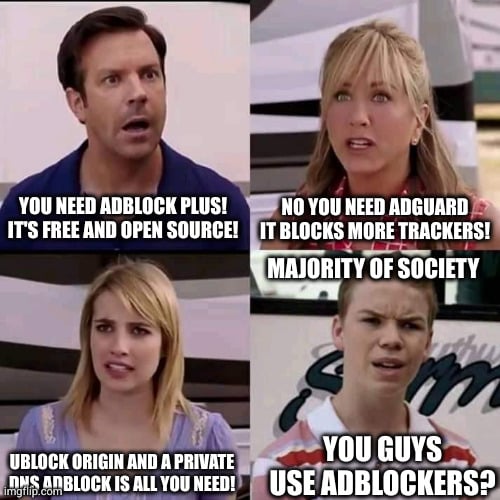this post was submitted on 17 May 2024
26 points (96.4% liked)
memes
10258 readers
2232 users here now
Community rules
1. Be civil
No trolling, bigotry or other insulting / annoying behaviour
2. No politics
This is non-politics community. For political memes please go to [email protected]
3. No recent reposts
Check for reposts when posting a meme, you can only repost after 1 month
4. No bots
No bots without the express approval of the mods or the admins
5. No Spam/Ads
No advertisements or spam. This is an instance rule and the only way to live.
Sister communities
- [email protected] : Star Trek memes, chat and shitposts
- [email protected] : Lemmy Shitposts, anything and everything goes.
- [email protected] : Linux themed memes
- [email protected] : for those who love comic stories.
founded 1 year ago
MODERATORS
you are viewing a single comment's thread
view the rest of the comments
view the rest of the comments

I think it is worth mentioning that patreon also surfaced as a means to provide income for creators. Whether this was a direct result of ad blockers may be debatable. However, patreon certainly provides creators with an avenue to generate income that is not dependent on ads services.
Then there are also creator focused platforms like nebula and curiosity stream, which aim to provide creators with a fair share of generated revenue.
All in all, my take on the developments over the past ten years or so is that ad revenue sharing (with creators) provided an important impulse to establish the field of online content creation, and that shortcomings of this model are now being addressed. Mainly to funnel more money to the content creators rather than platform owners.
I think the last really big hurdle to an actually democratized internet is that we need to make it easier to host at home.
Asymmetrical download upload is such a fucking pain. I would rather have 100 down and 100 up then 400 down and 5 up like I currently do.
On top of that, there aren't a lot of good systems in place to enable me to host a website from home. If IPv6 were common it would be easy for me to secure a static IP address and to point that to my DNS resolver and attach my domain, but since I've got to be on an ipv4 system since no provider in my area provides an on-ramp to IPv6 and even if they did the Grand majority of Internet users cannot resolve IPv6 addresses, it's dead in the water.
If every person in America had symmetrical upload download and a static IPv6 address for their home, we could get rid of the grand majority of the content provider and hosts and instead use democratized systems like bluesky and Kbin and Mastodon and free tube without having to worry about these multi trillion dollar companies' bottom lines.
puts on tinfoil hat
The asymmetrical internet speeds are intended to keep hobbyists and small businesses from self-hosting, thereby driving traffic to larger companies. I wonder if ISPs get any kind of kickback from large companies like AWS, cloudflare, or digital ocean. Like, reduced hosting costs for their websites and internal cloud services.
Takes tinfoil hat off
The reality is that it's probably a lot cheaper for ISPs to make connections asymmetrical because it effectively lets them pump up their download speed numbers for free. However, ISPs really should give customers the option to custom allocate bandwidth. Instead of saying X upload, Y download, you get X Mbps maximum and can choose the upload/download split.